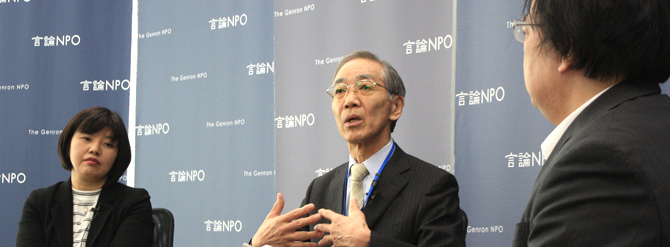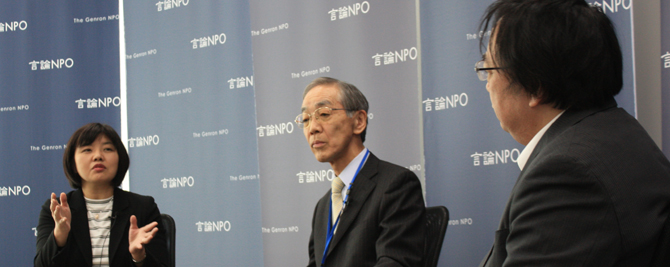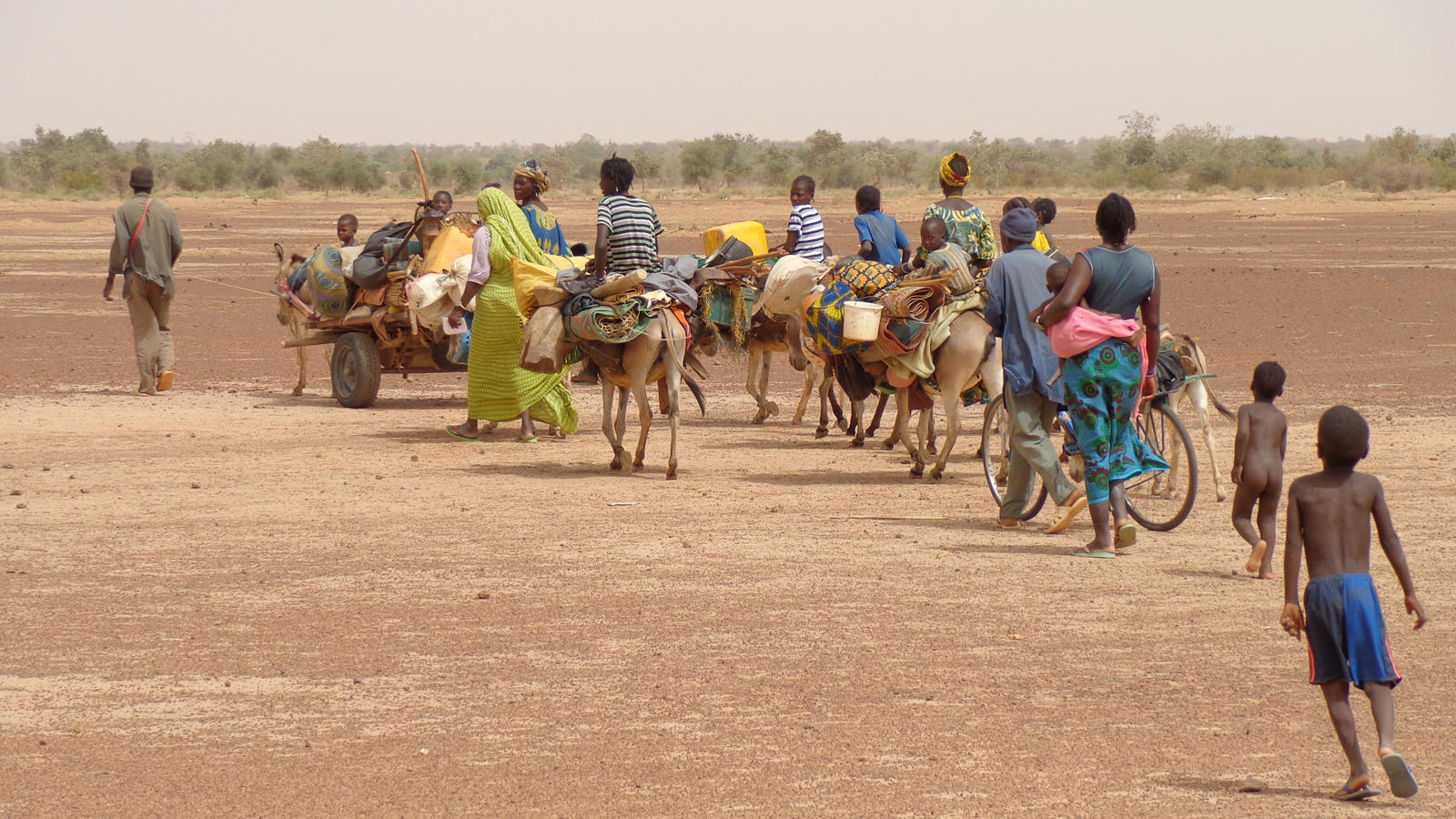
Japanese researchers have stressed the need to explore a new approach to the challenges facing refugees in the unstable global political environment.
The nature of refugees in today's world has changed, making it difficult for neighboring countries to receive displaced people under the existing international migrant protection system, Saburo Takizawa, chairman of Japan for the UNHCR (the United Nations High Commissioner for Refugees), said during a recent open discussion.
 nlike political asylum-seekers in the years of the Cold War, today's refugees have fled to other countries because their home countries have collapsed, said Takizawa, who formerly served as director of the UNHCR Office in Japan.
nlike political asylum-seekers in the years of the Cold War, today's refugees have fled to other countries because their home countries have collapsed, said Takizawa, who formerly served as director of the UNHCR Office in Japan.
"Refugees may be driven back at borders, but then they cross borders by sea," causing various political problems for the countries concerned, he said.
 Midori Okabe, a professor at Sophia University's Faculty of Law, referred to the Schengen Agreement among European countries, which calls for abolishing passport checks and other types of control at their mutual borders. The agreement is based on the idea that the free movement of people across national boundaries helps to stimulate economies in the area, and therefore, the Schengen Agreement will not be abolished simply because of Europe's problems with the continued inflow of refugees mainly from the Middle East, she said.
Midori Okabe, a professor at Sophia University's Faculty of Law, referred to the Schengen Agreement among European countries, which calls for abolishing passport checks and other types of control at their mutual borders. The agreement is based on the idea that the free movement of people across national boundaries helps to stimulate economies in the area, and therefore, the Schengen Agreement will not be abolished simply because of Europe's problems with the continued inflow of refugees mainly from the Middle East, she said.
Some European countries have temporarily suspended the system and introduced different border control measures, but the Schengen system is expected to be eventually restored and maintained, she said.
Okabe also called attention to the Dublin Regulation, the European Union law that determines which countries are responsible for examining applications by asylum-seekers. These countries must be selected from among states outside of the Schengen Area, but the surrounding countries, notably Hungary, Poland, Greece and Italy, are unhappy that the shared burden of accepting refugees is unfair.
The European Commission has come up with a proposal for reviewing the Dublin Regulation concerning application rules for refugees in the EU area, but Italy, Greece and other countries in Southern Europe actually find it very hard to handle the growing numbers of refugees, Okabe noted.

The discussion on the refugee problem was organized by the independent, not-for-profit Japanese think tank The Genron NPO, as part of its debate program series about the challenges facing the world since the inauguration of U.S. President Donald Trump's administration. Genron NPO President Yasushi Kudo served as moderator at the discussion.
There were an estimated 65.6 million refugees and displaced people at the end of 2016. This was the highest ever number, but it is likely to have increased in 2017, to about 70 million.
In a related development, U.N.-sponsored negotiations on the proposed Global Compact agreement aimed at introducing safe, orderly rules for migration protection began in February, though the United States declared its intention to withdraw from the process.
The inauguration of the Trump administration at the start of 2017 is cited as a reason for the current political instability around the world.
It cannot be said that the U.S. government's refugee policy has changed significantly compared to the days of the Barack Obama administration, according to Takizawa. The rate of authorized refugee applications has not declined, compared to that for the Obama administration, Takizawa said. But he noted that the Trump administration appears less interested in how to deal with refugees and political asylum-seekers.
"The United States has so far played a leading role in supporting international organizations for refugee protection, but this is crumbling," Takizawa said.
At the three-way discussion, he said that because middle-income people in America are losing jobs amid moves toward globalization, many Americans question whether the United States should continue its international obligations in the years ahead.
America spends the equivalent of \600 billion a year accepting refugees. It also supplies \150 billion to the UNHCR, covering one-third of its budget.
The United States appears inclined to reduce the number of refugees it accepts because it is becoming difficult to continue its financial contribution to the UNHCR budget, and this has made other countries nervous, Takizawa said.
The per capita cost for refugee resettlement in Japan is estimated at \4 million to \5 million, according to Takizawa. Protecting refugees in developed countries costs more, but a better burden sharing method, if established, will make it possible for neighboring countries to support refugees, and this will lead to an inflow of development funds into supporting countries, he said.
Germany spent the equivalent of \2 trillion accepting refugees from Syria in the past one or two years, Takizawa estimated. In order to receive one single refugee and get him or her accepted into developed countries, \10 million must be secured over a period of 10 years, but a recent estimate shows that the relevant cost will be only one-hundredth in developing countries, according to Takizawa.
Thus far, refugees have been accepted mainly by the United States and European countries because of their good will, and when they accepted refugees, their international reputation improved, but these diplomatic merits cannot be expected at present, Okabe said.

The European countries concerned are negotiating with neighboring states for their cooperation in accepting refugees, while efforts are being made to establish new refugee protection rules through U.N.-sponsored and other multilateral frameworks, including the Global Compact on Refugees initiative. It is unclear if these initiatives will succeed, and even if the Global Compact talks are successful, any agreement will not be binding, and as a result, more must be done to improve the situation in the years ahead, she said.
Noting that the Global Compact negotiations are expected to conclude at the end of 2018, Takizawa said that refugees' power will likely be used from now on to make it easier for them to contribute to the host countries by becoming self-sustaining. Refugees will be seen as "powerful people" from now on, not as "miserable people" as in the past.
In Lebanon, there are 1 million refugees, or equal to its population, while Turkey accepts 4 million Syrian refugees and spends \600 million supporting them.
The Global Compact envisages efforts to facilitate refugees' permanent settlement in third countries and to rebuild their home countries themselves as a fundamental solution, Takizawa said.
In exploring a new approach to the issue of refugees, the economic effects should also be studied, he said.
The situation must be improved so that refugee protection will benefit host countries, Takizawa said. He referred to a successful case in Jordan, where an industrial park, located near a camp for Syrian refugees but with few workers available in the area, accepted Syrian refugees and saw its business improve. "This was exactly a win-win relationship" as a refugees' workforce is used for economic development, he said.
European countries involved hope to see a scheme in which they will provide economic assistance to countries accepting refugees if they follow certain models, according to Okabe. This is aimed at helping to improve governance in developing countries, but some countries are concerned that the return of refugees may rekindle internal religious and racial conflicts, she noted, warning that the unstable political situation in the affected areas is unlikely to improve quickly.

Post a comment